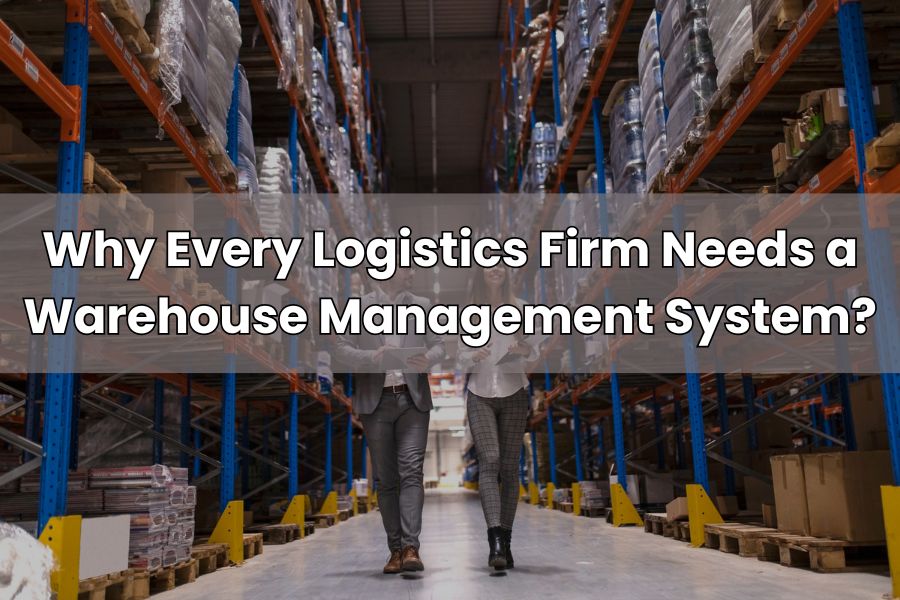Why Every Logistics Firm Needs a Warehouse Management System?
In today’s fast-paced world, logistics companies face numerous challenges in managing their operations efficiently. One of the key components of an effective logistics operation is warehouse management. A Warehouse Management System (WMS) plays a crucial role in streamlining operations, improving efficiency, and ensuring smooth business flow. But why is a Warehouse Management System in logistics essential for firm? Let’s explore the reasons.
What is a Warehouse Management System (WMS)?

A Warehouse Management System is software that helps manage the day-to-day operations of a warehouse. It ensures that goods are stored, tracked, and moved efficiently, and it integrates with other systems within the logistics supply chain. A WMS helps companies manage inventory, control warehouse operations, and improve overall productivity.
Why Do Logistics Firms Need a Warehouse Management System?
Improved Inventory Control
Managing inventory manually can lead to errors, resulting in lost or misplaced goods. A Warehouse Management System in logistics allows for real-time tracking of inventory, ensuring that stock levels are accurate. This helps logistics companies avoid stockouts or overstocking, both of which can negatively impact their operations.
Increased Efficiency
A WMS automates many manual tasks, such as tracking products, assigning tasks, and processing orders. This automation leads to faster and more accurate order fulfillment. As a result, logistics firms can deliver goods to their customers more quickly, improving customer satisfaction.
Better Space Utilization
Warehouse space is often limited, and inefficient use of that space can result in lost productivity. A Warehouse Management System in logistics helps optimize warehouse layout and storage systems. By using advanced algorithms, it ensures that goods are stored in the most efficient way possible, which maximizes space utilization.
Enhanced Accuracy and Reduced Errors
Manual processes are prone to human error, which can be costly for logistics companies. With a WMS, logistics firms can reduce errors related to order picking, packing, and shipping. The system automatically updates inventory levels and provides real-time information on product availability, leading to more accurate operations.
Streamlined Order Fulfillment
A key advantage of a Warehouse Management System in logistics is its ability to streamline the entire order fulfillment process. From receiving orders to shipping them out, a WMS helps logistics firms ensure that products are delivered on time and in good condition. It also helps in managing returns and exchanges efficiently, reducing delays and costs.
Data-Driven Decision Making
A Warehouse Management System in logistics collects valuable data, such as inventory levels, order history, and shipping performance. This data can be analysed to make informed decisions about inventory management, procurement, and overall supply chain strategy. It helps logistics firms improve their forecasting and planning capabilities.
Cost Reduction
By improving efficiency, reducing errors, and optimizing space, a Warehouse Management System in logistics helps logistics firms lower their operational costs. With better inventory management, fewer resources are wasted, and the overall process becomes more cost-effective. This, in turn, allows companies to pass on the savings to customers or invest in other areas of the business.
How Does a Warehouse Management System Improve Customer Satisfaction?
The faster and more accurately logistics firms can fulfil orders, the more satisfied their customers will be. With a Warehouse Management System, firms can ensure timely deliveries, reduce errors in shipments, and offer real-time tracking information. All of these factors contribute to higher customer satisfaction and repeat business.
FAQs: Frequently Asked Questions
What is a Warehouse Management System (WMS)?
A WMS is software that manages warehouse operations, including inventory control, order processing, and space utilization, improving efficiency and accuracy.
How does a WMS help in inventory management?
A WMS provides real-time tracking of inventory, reducing errors, preventing stockouts, and ensuring optimal stock levels.
How does a WMS improve customer satisfaction?
By enabling timely deliveries, reducing shipment errors, and offering real-time tracking, a WMS enhances customer experience and loyalty.
Why is a WMS essential for logistics firms?
A WMS streamlines warehouse operations, boosts efficiency, reduces errors, and helps firms remain competitive in a fast-paced logistics market.
How does KnoWerX help logistics professionals?
KnoWerX offers specialized courses in supply chain management, equipping professionals with the skills to optimize warehouse operations and succeed in the industry.
End Notes

Warehouse Management System in logistics industry is no longer a luxury; it’s a necessity. It streamlines operations, enhances accuracy, and helps logistics firms stay competitive in an increasingly fast-paced market. By implementing a WMS, companies can achieve better inventory control, increase efficiency, optimize space, and reduce costs, all of which directly impact their bottom line.
For logistics professionals looking to learn more about optimizing warehouse operations and other aspects of supply chain management, KnoWerX offers a range of courses. As a leading supply chain management institute, KnoWerX helps individuals and businesses develop the skills and knowledge needed to succeed in the ever-evolving logistics industry
Image Reference: Freepik
Disclaimer: All trademarks, logos, and brand names are the property of their respective owners. All company, product, and service names used in this website are for identification purposes only. Use of these names, trademarks, and brands does not imply endorsement.



